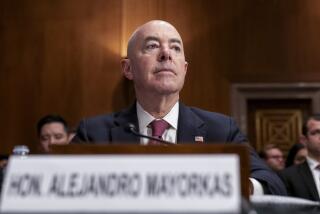Lesson No. 1: Don’t Talk Down to Young People
As the Senate impeachment trial is approaching, I’m afraid the American public will once again be subjected to long tirades about our “young people” learning the wrong lessons. If President Clinton is not removed from office, “our children” might conclude that certain misbehavior should not be punished and that lying under oath is OK. Just in case the senators are wondering, these aren’t the lessons I’m in danger of learning.
Obviously, lying under oath should be punished and middle-aged family men should not have secret sexual affairs with young women in their offices. These were my views before the Monica Lewinsky scandal broke, and they’re my views now. I learned that practically from birth from my parents, my grandparents and my teachers and no politician has any impact on my core values.
I have seen elected officials making too many self-righteous absolute pronouncements as though anyone who disagreed must be an idiot. The sanctimonious atmosphere of the House debates was very disappointing. Also, in an age of information explosion, why do so many people feel the need to stand up and repeat one another’s comments over and over again? Is this politics or show business? Or is there a difference?
If you really want to know, many young people have learned from watching the televised hearings that most politicians are windy, arrogant, sneaky, self-serving, obnoxious and power hungry. And of course we’re bored to tears hearing about the president’s sex life.
What I expected from our leaders was thoughtful judgment about what should be done with a president who got caught in a web of deceit trying to cover up an illicit affair. Too many members of Congress pontificated about the evils of lying under oath, as if all lies are the same and deserve the same punishment. Every fourth grader knows that’s not true.
Rep. Tom DeLay (R-Texas) said that it was also “a debate about relativism vs. absolute truth.” I don’t think it’s that simple. After all, where and when and how do we make our moral decisions? As Isaiah Berlin wrote, “We are doomed to choose, and every choice may entail an irreparable loss. I can only say that those who rest on such comfortable beds of dogma are victims of forms of self-induced myopia, blinkers that may make for contentment but not for understanding of what it is to be human.” Indeed, the very definition of a human being requires us to make moral choices. That’s not relativism; it’s sign of being alive.
So far, I have seen no road map, including the Bible, that tells me what to do in every circumstance every day. Even lying. My parents taught me to tell the truth, but not to go out of my way to hurt others. If I choose not to tell “the whole truth” in order to spare a friend unnecessary hurt, am I “absolutely wrong”? Who among us can step out of her own skin to judge objectively the right course of action in all cases? I am not defending lying under oath. I am not defending lying at all. What I am defending is the right to look at each instance in a context. These politicians weren’t protecting young people. They were insulting our intelligence. We know all law breaking is not equal.
The premise of the “for the good of the children” argument was that not impeaching Clinton would send the message that lying is rewarded. That’s absurd. He has been publicly degraded and humiliated in a way that few could stand. His family, his friends and his associates feel betrayed by him, and he knows it. The question now is: Should he be punished more? And if the answer is yes, should the punishment be the most extreme?
The impeachment spectacle has reaffirmed for me that truthfulness is better than lying. If President Clinton had been truthful from the beginning, he would have been thoroughly embarrassed and rightfully criticized. But he could have been no more embarrassed than he is now, and he would probably not have been impeached. If anything, the lesson that has been driven home to me is that the truth is always better. I didn’t need vindictive political opponents of the president to teach me that.
More to Read
Get the L.A. Times Politics newsletter
Deeply reported insights into legislation, politics and policy from Sacramento, Washington and beyond. In your inbox three times per week.
You may occasionally receive promotional content from the Los Angeles Times.







